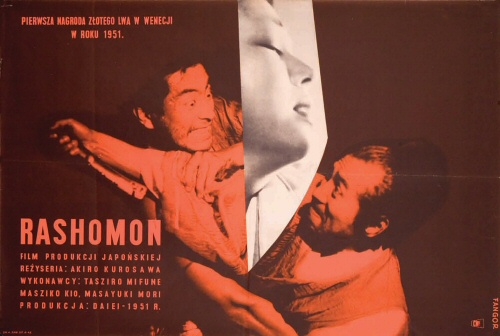|
|
 |
|

(1950, directed by Akira Kurosawa)
- inducted 2017 –
“In Akira Kurosawa's Rashomon (1950), three characters--a brigand (Toshiro Mifune), a samurai (Masayuki Mori),
and the samurai's wife (Machiko Kyo)--are compelled, through the human impulse to turn actual events into stories, in the
name of arriving at the truth and meting out justice, to re-enact, over and over, the tragic results of their brief meeting.
Due to another human impulse, the need to be seen as the person one might prefer to be, the details of their story keeps shifting.
The brigand raped the wife, or maybe he seduced her; he then killed her husband, maybe at her urging, maybe not, in a battle
that may have been a noble clash between two skilled fighters or may have just been pathetic. Even the account of an eyewitness
(Takashi Shimura) who at first seems to be a purely impartial observer is exposed as something other than the pure truth.
If Jean Renoir believed that the terrible thing is that everyone has his reasons, Kurosawa believes that there is no such
thing as objective truth, at least not if we depend on stories, because everyone has his own agenda.
“In the West, Rashomon made made its director's name synonymous with Japanese cinema, and it gave a name, the
‘Rashomon effect,’ to its central insight into human behavior and the nature of truth. But though its technique
has been imitated countless times (including the misbegotten Hollywood remake The Outrage), most of he attempts to
use it as a mode don't linger in the mind the way it does. That's partly because the sheer power of Kurosawa's film cannot
be equaled by lesser directors, but it's also because most of his imitators, misinterpreting his work or simply being less
bold than the master, don't go as far with it as he does. (Kurosawa didn't invent the concept, but he did more with it than
most.)
“Most modern works in which unreliable narrators reveal their motives and deceptive self-images by constructing competing
narratives around the same event end up playing the discrepancies for laughs, or, worse, use it as a set-up before triumphantly
revealing what ‘really’ happened. Rashomon leaves you uncertain about everything that happened, ending on a note
of cautious encouragement to get on with life by living it in the moment, doing what's needed and not worrying about closure
and the ‘real,’ final truth. Now that the film is canonical, many people may overlook the fact that using a visual
meeting that capitalizes on people's inclination to believe whatever their eyes are telling them to convey this message is
highly subversive.”
~ Phillip Dyess-Nugent
|
 |
|
Principal cast: Toshiro Mifune, Machiko Kyo, Masayuki Mori, Takashi Shimura, Minoru Chiaki, Kikijiro Ueda, Norika Honma, Daisuke
Kato
Screenplay by Akira Kurosawa and Shinobu Hasimoto
Based on the stories “Rashomon” and “In a Grove” by Ryunosuke Akutagawa
Produced by Minoru Jingo
Executive producer: Masaichi Nagata
Director of photography: Kazuo Miyagawa
Production design by Takashi Matsuyama
Film editing by Akira Kurosawa
Original music by Fumio Hayasaka
Japan
Duration: 88 minutes
Languages: Japanese
Filmed in black and white
Sound mix: Mono (Western Electric Recording)
Aspect ratio: 1.37:1
Produced by Daiei Eiga
Released in USA by RKO Radio Pictures
Premiered in Japan on 25 August 1950
USA release date: 26 December 1951
Awards and honors:
- Selected as one of Roger Ebert’s “Great Movies,” 26 May 2002
- Venice Film Festival, 1951: Golden Lion (won)
- Venice Film Festival, 1951: Italian Film Critics Award (won)
- Academy Awards (USA), 1951: Honorary Award – Outstanding Foreign Language Film (won)
- National Board of Review: 1951: Best Director, Akira Kurosawa (won)
- National Board of Review: 1951: Best Foreign Film (won)
- Academy Awards (USA), 1952: Best Art Direction – Set Decoration, Black and White (nominated)
- BAFTA Awards, 1952: Best Film From Any Source (nominated)
- DGA Awards, Directors Guild of America, 1952: Outstanding Directorial Achievement in Motion Pictures, Akira Kurosawa (nominated)
- NYFCC Award, New York Film Critics Circle, 1951: Best Foreign Language Film (2nd place)
- National Board of Review: one of the Top Ten films of 1951
|
 |
|
|
 |
|
|
 |
|
|
|
|
|
|
 |

